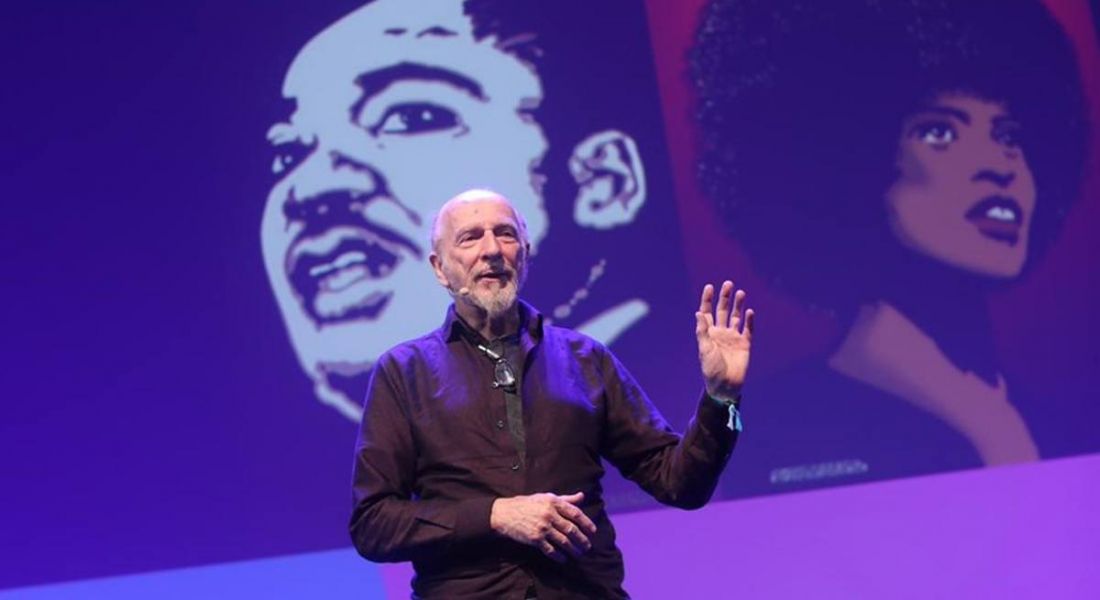At Inspirefest 2019, it was clear that the power of storytelling is at the heart of the future of work. So, take some notes and learn how to tell your story, writes John Kennedy.
Now in its fifth year, it is impossible to walk away from Inspirefest without some burning, invigorating insights.
Inspirefest 2019 was no exception. Whether it was Anil Dash, an early investor in Trello, bringing us on a history of the original and authentic voices of the web and blogosphere; Cat Oyler from Johnson & Johnson discussing the future of human health; Mark Pollock’s moving story about how he was unbroken by blindness and paralysis and successfully raced to the South Pole; or Ciara-Beth Griffin creating an app to help young people with autism to have better social interactions – there was a common thread.
‘It’s about life, decisions and execution’
– DES TRAYNOR
Observing Jim FitzPatrick, the artist and creator of the iconic Che Guevara image, move the audience by sharing his journey from Thin Lizzy album covers to celebrating long-forgotten Celtic goddesses to campaigning against the last Magdalene laundry in Dublin being turned into a hotel, the common thread was that these people are all incredible storytellers.
A lyrical tradition
Liza Donnelly. Image: Conor McCabe Photography
In Ireland, it is the lyrical tradition of storytelling through the written word or song that makes us gather round and listen. And that endures through different media such as art, cartoons, digital, video, music and dance – all art forms that were in evidence at Inspirefest 2019.
“Resilience” was a word that rung out like a clarion call when I heard Áine Kerr from Kinzen talk about the future of journalism being led by communities while her co-founder Mark Little pointed out how instead of journalism being destroyed by the emergence of powerful platforms, any storyteller with a following of up to 5,000 readers or followers pretty much already has a business model they can exploit.
To be a good storyteller, first you need to be a good listener. New York Times cartoonist Liza Donnelly told Inspirefest 2019 how, in the strange world of Trump’s America, unlike her colleagues going straight for the jugular she learned to demonstrate a more penetrating, acerbic wit and razor-sharp analysis by simply waiting, listening and observing.
“I learned that it was best to wait and not react immediately to what is going on. I’ve learned of course to watch, observe and really see people. I learned to listen. And I think that if we do that on a daily basis, we might get through this together. Cartooning is all about communications, dialogue and exchanging ideas.”
In the present and future of work, people have already become storytellers, communicators and community builders through use of platforms like Slack. Stuart Templeton, head of Slack UK, framed the importance of organisational agility in the age of the knowledge worker. “40pc of Fortune 500 companies will be extinct in the next 10 years because they will have failed to build resilience into the organisation or respond to changes in market conditions.”
Templeton said that to be the glue that bonds disparate groups around a core objective, a narrative is needed. “It is about the bringing together of both agility and corporate alignment around a shared north star.”
Earth ambassador Zile, founder of Zile Organics, said the business of achieving goals begins with the individual and it is important to write down our hopes and ambitions. “We live in the 21st century, there are no excuses. Write down the things that are important to you and say, ‘Damn, I got that right.’ You are never going to fail because it is what you have decided to exchange your life for. Think about writing it down.
“When you look back on your life, make sure you have lived what you want to live – no big goals, no small goals, just write down what you are going to achieve.”
Your story is your role in history
Inspirefest 2019 was spellbound by the story told by Theranos whistleblower Erika Cheung, who lifted the veil on a hyped miracle medtech start-up that at its peak was worth $10bn and today is worth nothing. Cheung’s recollection was storytelling at its finest, including the harrowing parts where she was followed and investigated by the company desperate to keep a lid on a smoking gun.
The entire experience and her work at Betatron in Hong Kong has spurred her on to start Ethics in Entrepreneurship.
“I noted that we are very good about teaching start-ups and tech workers how to scale and iterate, but never about the shadow side, and really they don’t have a lot of good resources when they face ethical dilemmas in these environments that are fast-paced, challenging and all about survival,” she said.
“The founder’s journey”, a tale told awesomely by Intercom co-founder Des Traynor, described how a few Irish entrepreneurs in just a few years to built a San Francisco unicorn tech giant with 30,000 customers. “When you look back from a clear narrative, what you don’t see are all the decisions: starting a company or not, hiring that person or not. It does not always make for a great movie, but: ‘This is not a movie, dog,’ as Jay-Z said,” said Traynor.
He also pointed out that in spite of all the start-up gloss, very few people see the tough stuff that happens along the way. “It’s about life, decisions and execution. How well you execute is the biggest control variable in your success, and this is true of life, start-ups and relationships.”
Erika Cheung. Image: Conor McCabe Photography
The founder’s journey, Traynor revealed, was a story of states of personal and professional failure, success and fortune. “Ignore the top tips and hustle BS. Life is about decisions – you do you and whatever happens, happens. In terms of execution, rely on the contingency of progress and break out of negative cycles.”
Rafferty Jackson from Jack Industries, who played a leading role in the success of Beats by Dre (which was snapped up by Apple for $3bn), told Inspirefest that the success of Beats was down to effective storytelling by its founders, rapper Dr Dre and Interscope Records co-founder Jimmy Iovine. Similarly, setting out a narrative for people to follow was instrumental in the success of key figures from history from JFK to Steve Jobs.
“Lay your foundations in your personal and professional ‘why’, and tell your story.”
Want stories like this and more direct to your inbox? Sign up for Tech Trends, Silicon Republic’s weekly digest of need-to-know tech news.




